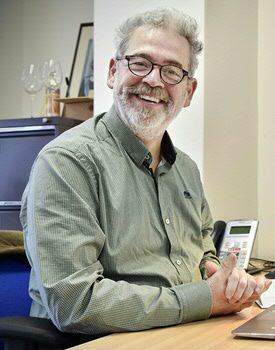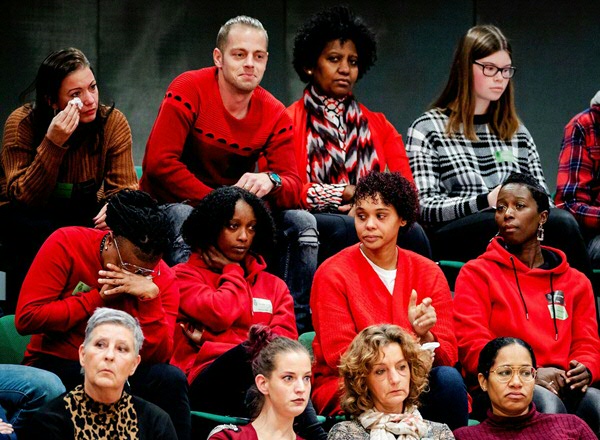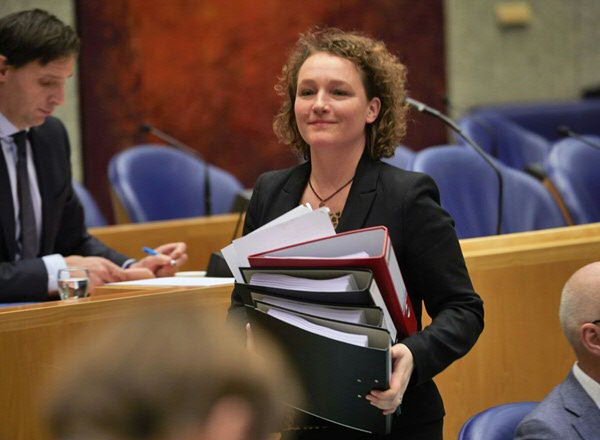When government fails its citizens

More and more often, we are seeing how people can find themselves in trouble because of the actions of government. Why does the government take such a hard line in these cases, and what can be done about it? Professor of Social Security Law Gijsbert Vonk and member of the House of Representatives and alumna Renske Leijten (SP) discuss the human dimension of the welfare state.
Profiteers: that is how people who receive benefits such as such as unemployment benefits and the childcare allowance are often seen, says member of the House of Representatives Renske Leijten. Take, for example, the lady from Wijdemeren who featured in the news because she had to pay back the costs of the weekly groceries that her mother had bought for her to compensate for her unemployment benefits. Leijten: ‘Someone went to check up on her and saw that her groceries came from the supermarket Albert Heijn. They decided that something was wrong because there was no way that she could afford to shop there. That is really taking things too far.’
Fraudsters
Professor of Social Security Law Gijsbert Vonk agrees. The image of the ‘scrounger’ who profits from the welfare state when they could in fact be working is the reason for the government’s strict detection and enforcement policy. ‘For years, politicians have drawn attention to “undeserving” claimants, and in particular to fraud. This started in the mid-1990s, and very soon such people came to represent everything that was wrong with the welfare state. Politicians focused on this “fraud” so that they could present an image of being the one to save society from such people,’ says Vonk. ‘The legitimacy of the welfare state is under threat and, out of fear of plummeting support for social security benefits, politicians wanted to show that they were defending its proper use by exaggerating fraud and introducing increasingly higher penalties.’

Enforcement industry
Enforcement has become an industry in itself, continues Vonk. ‘With its own objectives, its own reporting mechanisms and its own administration.’ He still remembers how things worked when he was head of the department for legal affairs at the SVB (the organization that implements national insurance schemes in the Netherlands). ‘My experience is that there are various divisions in such large organizations. Enforcement is one of these divisions, and the people who work there tend to operate separately from the rest of the organization.’
Chasm
There is also a chasm between politicians and civil servants on one side, and the general public on the other, says Leijten. ‘Those who develop and implement policy are far removed from those who depend on it. They live in different neighbourhoods and their children go to different schools. For a long time, I wondered how it was possible that the childcare allowance scandal remained hidden for so long. Well, it’s because no-one was looking at things from the point of view of the claimants; nobody realized how big the problem was.’ Vonk: ‘But that is no more than an excuse because they could have known that these people were in serious trouble; the information was there.’ Vonk is referring, for example, to reports from 2013 and 2016 published by the National Ombudsman that show that people were being wrongly accused of fraud. ‘But there is a difference between knowing something and really taking it in. The penny just didn’t drop.’
Ideal citizen
The chasm between the ‘administrative elite’, as Leijten calls it, and the general public is one thing. However, Vonk says that there is something else at play too: the ‘ideology of small government.’ He explains: ‘Small government has become a kind of ideal: a government that focuses purely on its core function and, to achieve that, leaves as much as it can to the individual citizen. The ideal citizen is articulate, well-educated and behaves responsibly. In the case of allowances, for example, people are expected to make sure that they have not been paid too much. The idea was to pay the childcare allowance with a minimum of contact with the claimants.’ This is a consequence, he says, of the shift from ‘street-level bureaucracy’ to ‘system-level bureaucracy’. In the past, we had social workers who were free to help people at the ‘street level’. These no longer exist, and the system, with its many strictly-defined processes, has taken over.

Sjakies
Leijten calls social workers ‘Sjakies’, after the social worker who helps the lower-class Flodder family move into the upper-class area of Zonnedael in the well-known Dutch film Flodder. Both Leijten and Vonk think that these social workers should return. Leijten: ‘Everyone should have their own Sjakie, because one of the most important lessons from the childcare allowance scandal is that you can replace a lot, but you cannot economize on people. People will always have problems and, when they do, they need someone to take them under their wing and help them to sort it out – a Sjakie. Social workers need to be able to communicate with all the relevant authorities, so that they can really do something to solve people’s problems.’
Contact
Leijten also thinks that it should be easier for people to get in touch with organizations like the Tax and Customs Administration (Belastingdienst). ‘Lots of offices have closed in recent years but you should be able to just get on your bike and go and talk to someone.’ Vonk comments dryly: ‘It’s hard enough to contact them by phone.’ A greater focus on prevention and on solving problems before they become too big is one of the fundamental changes that is needed in welfare agencies, believes Vonk. ‘These agencies need to realize that policy has to be developed with the human dimension in mind. They should be obliged to do so.’
Time for change
Finally: should the childcare allowance be abolished? In any case, it needs to change, says Vonk: ‘Allowances help a lot of people. They help to reduce income inequality, not just for the unemployed but also for people who earn less than they should.’ Because benefits such as the childcare allowance and the state pension are for everyone, Vonk believes that they help ensure support for the welfare state. Leijten is not so sure, and wants to get rid of benefits ‘once and for all’ by making them superfluous. ‘My party wants a means-tested healthcare insurance contribution, free childcare, a considerable rent reduction and a hefty increase in the minimum wage. We do not believe that everyone should get the same. For example, give the childcare allowance to people with an income up to 85,000 euros, then reduce it gradually. Everyone will understand why, and it will save billions to help people at the social minimum.’
Whatever happens: they both agree that it is time for change. Because of the childcare allowance scandal, support in society for the human dimension is probably higher than it has been for a long time, says Vonk. ‘It’s pretty much an open goal.’
Renske Leijten (1979) studied Dutch language and culture at the UG and became an active member of ROOD, the youth section of the Socialist Party (SP), while she was a student. She chose to go into politics full time after obtaining her Bachelor’s degree. As a member of the House of Representatives for the SP, between 2006 and 2017 she focused on public health and youth care, then finance, Europe and the EU. Together with Pieter Omtzigt (CDA), she was responsible for drawing attention to the childcare allowance scandal in 2019.
Gijsbert Vonk (1960) studied law in Amsterdam and London before receiving a PhD from Tilburg University in 1991 for his research into the coordination of minimum subsistence benefits in the EU. He was head of the department for legal affairs at the SVB until 2006, when he became Professor of Social Security Law in Groningen. He is also Professor by special appointment of Social Security Law at VU Amsterdam.
This article has been taken from our alumni magazine Broerstraat 5. Text: Dorien Vrieling
| Last modified: | 04 May 2021 08.46 a.m. |
More news
-
16 December 2024
Liekuut | Alette Smeulers: 'Human rights violations are also about us'
'The Middle East is ablaze, a war is raging in Eastern Europe, and the US elected an extremely unpredictable president who is undermining democracy: human rights are under pressure.
-
18 November 2024
Bigger than femicide alone – the role of gender in violence
In the media and politics, there is rising attention to femicide — the murder of women, often by a partner or a former partner. Martina Althoff, associate professor of Criminology, welcomes this but is critical at the same time.
-
09 October 2024
Automating the taking of witness statements in criminal cases using AI
Can the taking of witness statements in criminal cases be automated using artificial intelligence (AI)? The University of Groningen (UG), Capgemini Netherlands and Scotty AI signed a letter of intent today to jointly research the development of an...
